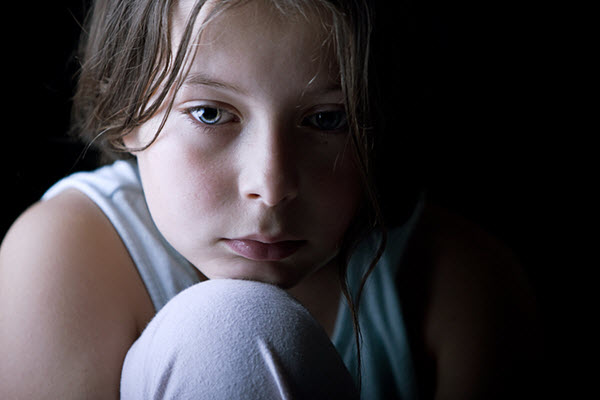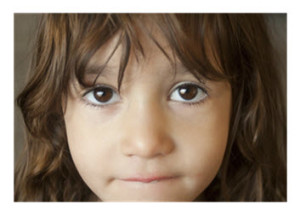
A 10-year-old girl runs through the rain on a summer day. She is alone, and she is crying, and her tears mix with the downpour she doesn’t seem to notice. She has no rain gear. No umbrella. Nothing to shield her from the water streaming from the dark sky. But she isn’t worried about getting wet. She has never run so fast or so hard, and she feels as if she is running for her life.
The child races up a nearby hill to a neighbor’s house, but the neighbor is out. Panicked, her hair and clothes now thoroughly soaked, the girl runs back down the hill past her house to another neighbor’s home where, to her relief, a woman answers the door.
The girl explains to the neighbor that her mother has sent her for help. She tries to put into words what she has just witnessed — her father on the floor, gasping in pain, unable to breathe or talk. It’s the scariest thing she’s ever seen… scarier than the time Grandpa passed out at church, or when he fell at the end of the hallway and couldn’t get up. This was even more frightening than seeing him in his casket at his funeral.
The neighbor and the girl hurry back to the house through the rain. On entering, they witness a chaotic and desperate scene unfolding as the child’s mother tries clumsily to administer CPR and her older sister calls 911, then takes the 10-year-old into a bedroom.
From the window, both girls watch an ambulance pull into the driveway. They hear the commotion as a team of people make their way inside and take their dad away, as their mom leaves to accompany the ambulance to the hospital.
The sisters wait in silence punctuated only by a few frantic phone calls to family and friends. As the minutes turn into hours, and they play card games to pass the time. Eventually, they hear the kitchen door open and close. Mom is home… but why isn’t she with Dad at the hospital?
“He’s gone,” she says.
And, just like that, their lives are changed forever. This was the beginning of a new normal without their dad.
From “Failure” to Survival
Reading this story today, I feel such compassion for that little girl. But that hasn’t always been the case. I used to beat her up for every failure and mistake, not only in childhood but in adult life. For so long, I could not find any generosity of spirit for that child, even though “she” is me.
Over the years, I’ve lamented so many bad decisions and failures in life, including work failures, a failed marriage, failed friendships, and broken dreams.
The years after my dad’s death were busy and hectic and demanding — so much so that I was never able to pause and feel for that little girl who saw her much-adored father die right before her eyes. Instead, expectations were unwavering: Grades still had to be high, awards and medals still had to be won, leading roles still had to be played and ballet recitals still had to be performed. There were chores still to do and jobs still to be had. And smiles were a requirement through it all.
 I was never allowed to feel the least bit sullen or sad or angry about Dad’s sudden death. “Don’t be morose,” Mom used to say.
I was never allowed to feel the least bit sullen or sad or angry about Dad’s sudden death. “Don’t be morose,” Mom used to say.
My sister and I were both pushed to move on as if nothing devastating had happened. So we did. To allow our father’s death to impact us in any way would be deemed a failure, and failure was not an option.
Adult Children, in the Shadow of Trauma and Alcoholism
Meanwhile, as I smiled, “moved on,” and persevered through childhood, adolescence, and young adulthood, Mom struggled with deep depression and alcoholism.
It wasn’t until after my mother died of alcoholic liver disease more than 20 years later that I arrived at this realization: I was finally free to examine my own thoughts and feelings about losing my father in such a traumatic way, at such a tender age.
When Mom was alive, the story was hers; as the widow, she often reminded us, she ‘suffered the most.’ She owned the grieving experience, which was filtered through her perspective alone. After her death, I had space and peace to acknowledge that my father’s death was a significant event in my life. It was so significant, I now realize, that it largely shaped me into the person I am today, for better and for worse. (Sorry, Mom. I tried not to let it affect me, but it did, and it does.)
Pretending that traumatic loss didn’t impact me only prevented me from dealing with the psychological and developmental effects for many years. It’s called denial, and it’s a very effective coping method… until it isn’t.
“Dwelling” vs. Examining
After years of being warned against “dwelling in the past,” when I was finally allowed to reflect and process, I could start to accept myself and the loss, and only then begin to move on. With my mother gone, I was free to remember and examine the experiences that I lived from childhood through young adulthood, enabling me to release myself from them once and for all.
I was also working to fully grasp and contextualize the reality that my mother was an alcoholic, all that her alcoholism-infused behaviors had wrought over the years, and to confront her loss. Engaged in this process — confronting anger, resentment, love, and loss — I learned what it means to be an adult child of an alcoholic and survivor of childhood trauma. This allowed me to begin the journey of regarding myself as more of a survivor rather than a failure.
I researched to learn more about the impact of these experiences. In reading about adult children of alcoholics, and survivors of childhood trauma, I felt like I had found my tribe. I was no longer alone in my experience. Things finally seemed to make sense to me…

Personal Journeys
If I seem to blend my understanding of the effects of childhood trauma and the impacts of being raised by an alcoholic, maybe it is because, for me, they are intertwined. The person I am is the result of both experiences, entangled together and reinforced by each other.
Throughout my teens and 20s, I thought that the debilitating self-doubt, anxiety, sense of doom, insecurity, depression, and indecision I felt were normal, or that these feelings existed because of my own inherent shortcomings and flaws as a person. I know I am flawed, but I now realize that those feelings and related personal attributes are prevalent in survivors of childhood trauma, and in adult children of alcoholics.
In fact, I was stunned at the similarities, especially when I read this so-called “laundry list” of attributes for adult children of alcoholics:
1. Afraid and isolated – fears authority figures
2. Approval seeker who has lost one’s own identity
3. Frightened by angry people and criticism
4. Become alcoholics, marry them, or both – and/or find someone with another compulsive disorder such as workaholism to feed our sick abandonment needs
5. Extreme guilt feelings – especially when standing up for ourselves or our needs
And the list goes on.
Childhood Trauma
Many of us have experienced some sort of trauma as a child — death, divorce, abuse, adult addiction, illness or accident. You might say, most of us are walking wounded for some reason or another. And, if you have survived, if you are reading this, you deserve compassion. We all do, especially as survivors of trauma.
If the trauma cocktail we endured includes alcoholism, as adult children of alcoholics, we are likely to be our own worst critics nearly all the time. Among the items on the complete AdultChildren.org list of attributes mentioned above — judging ourselves harshly and tending toward low self-esteem.
Even as we think we are recovering from painful memories, easily triggered fears, and experiences that are difficult to comprehend and process, there is this reality of surviving childhood trauma. Sometimes, just being alive, getting through the day, and functioning as a contributing member of society are huge accomplishments.
 And this may be news to some of you: Studies show that experiencing trauma as a child impacts development of our brains into adulthood — it alters brain chemistry, personality, and coping mechanisms — for life. Furthermore, the physiological and emotional impact can result in severe physical illnesses from cancer to autoimmune diseases.
And this may be news to some of you: Studies show that experiencing trauma as a child impacts development of our brains into adulthood — it alters brain chemistry, personality, and coping mechanisms — for life. Furthermore, the physiological and emotional impact can result in severe physical illnesses from cancer to autoimmune diseases.
What Helps Us Heal?
If you’ve ever experienced adverse or traumatic events during childhood, you may find it helpful and cathartic to look inward — to explore your feelings about your experience(s) and how you were impacted.
Reflection, in a variety of forms, is an essential tool. Writing about your experiences helps. Reading and researching help. Meditating helps. Talking with a caring friend helps. Slowing down for some self-awareness and self-care can work wonders. Getting professional counseling can certainly help. Sharing with others who have also survived childhood trauma — and possibly of a similar type to yours — may significantly lessen any embarrassment, isolation, shame and other damaging negative feelings you may be carrying.
You may find that many of the challenges and disappointments you’ve faced are directly related to the trauma you experienced during childhood. Making that connection can help you to take control, take a bit of the pressure off, and potentially relieve some haunting feelings of failure, regret, or insecurity. You may begin to recognize patterns of behavior that developed over time as a survival mechanism, which is no longer necessary, making way for new, more constructive thoughts and behaviors.
Since my mother’s death, it’s up to me to parent myself — to be the parent I always wanted to have but didn’t. I’ve worked hard to learn how to care for myself in a more encouraging, positive, and unconditionally loving way. At the very least, I try not to be so critical and unforgiving. I do my best to celebrate the small victories, and not be as devastated by the missteps. I’m trying to be more understanding of mistakes made, and to show compassion for the person who made the mistakes — especially that scared little girl running through the rain.
© Andrea Clement
Andrea Clement is a healthcare writer and communications professional. Her background in medical sales, training, and healthcare recruiting led to her role as the Guide to Health Careers for About.com / now VeryWellHealth.com. She has contributed to books, journals, websites, TV & radio segments as a healthcare career expert. She writes about her experience as an adult orphan on her blog, No Parents No Problem. She is currently a marketing executive for a healthcare staffing firm. Learn more about Andrea here. Follow Andrea on Twitter at @AndreaSantiago, or connect with her on LinkedIn.
You May Also Enjoy
“Sometimes, just being alive, getting through the day, and functioning as a contributing member of society are huge accomplishments.” Yes!
Thank you for sharing, Andrea. It’s been my experience that the only ones who understand are the ones who’ve also experienced childhood trauma and an alcoholic parent.
I’m glad you’re showing yourself caring and concern and appreciate you helping me feel less alone today.
As someone who experienced 4 traumas in childhood, 4 of the 5 items apply to me. That “laundry list” applies to more than just survivors of alcoholic parents. Mine were neither, just abusive and little girl selfish. It took me a very long time to trust enough for therapy. Therapy and mindful meditation make it possible to awaken each day without depression and hopelessness. Now in my senior years I am trying to make a life and find a little happiness and love.
Very interesting. Having worked with an adult survivor of similar trauma and experienced first-hand their self-destructive behaviour, this is very familiar. And as the daughter of a woman who experienced the Blitz in London, I recognise a lot of these points discussed. Don’t make a fuss, do your bit and don’t think about it – not really very helpful in the long run but necessary in wartime. No fun 80 years later.